|
|
|
Sort Order |
|
|
|
Items / Page
|
|
|
|
|
|
|
| Srl | Item |
| 1 |
ID:
128675
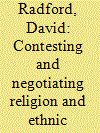

|
|
|
|
|
| Publication |
2014.
|
| Summary/Abstract |
Post-Soviet Central Asia has inherited a set of circumstances conducive to the revitalization of religion. The renewal of Muslim awareness and identity in Central Asia may not be surprising, but the growth of Christianity is, especially in its Protestant form within indigenous Muslim communities. This article, based on qualitative field research, reviews one example of this development: the process of conversion to Protestant Christianity among Muslim Kyrgyz in Kyrgyzstan. A prominent aspect of this social movement has been the ways in which Kyrgyz Christians have entered into a dynamic process of engaging with issues of identity and what it means to be Kyrgyz - a process that has sought to locate their new Christian religious identity within, rather than on the margins of, familial and ethnic identity, and one that challenges the normative understanding of Kyrgyz identity: that to be Kyrgyz is to be Muslim. While providing the context for Kyrgyz conversion, this discussion primarily focuses on the way Kyrgyz Christians utilize a number of different discursive strategies to contest normative Kyrgyz identity constructs and to legitimize a Kyrgyz Christian identity.
|
|
|
|
|
|
|
|
|
|
|
|
|
|
|
|
| 2 |
ID:
144686
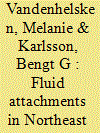

|
|
|
|
|
| Summary/Abstract |
This introduction presents the context and theoretical basis of fluidity of attachments in Northeast India. A large cultural, linguistic, and ethnic diversity, an international border situation, and various forms of unsettled relations with ‘mainstream India’ characterize Northeast India. These aspects form the frame of highly dynamic movements of identity and ethnicity formation. This special issue includes five papers that focus on these dynamics in terms of ‘fluidity’; they present new situations of shift between different layers of identification, re-signification of cultural practices in the process of their selection as emblems of groups‘ identity, changes in groups’ specific practices after religious conversion, and shifts from one identity to another. They show that shifts of ethnic identity are old processes in the region, whereas other levels of identification, such as lineages, clans, villages, and new ‘cosmopolitan’ identities coexist alongside ethnic identity, and gain particular salience in certain situations or points of time.
|
|
|
|
|
|
|
|
|
|
|
|
|
|
|
|
| 3 |
ID:
144899
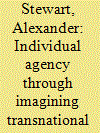

|
|
|
|
|
| Summary/Abstract |
This study examines subjective, social, and transnational aspects of conversion to Islam in modern China by examining the “conversion careers” (Gooren (J Sci Stud Relig 46(3):337–353, 2007), 2010) of seven “new Muslims” who reside in and around Xining, Qinghai Province. Examining their experiences that include pre-conversion socialization, initial encounters with Islam, study of the faith, conversion, and expressions of a new Muslim identity reveals a complex interaction between sociocultural circumstances and individual agency. Rather than gradually succumbing to local ideas of Islamic orthodoxy or passively obeying religious authorities, converts study Islamic texts, form a variety of interpretations, and express their newfound belief in various individual and collective ways that often conflict with social expectations, local Islamic norms, and moral authority of the Chinese state. Converts draw confidence to pursue these conversion careers by believing in the universality of their faith and imagining themselves as part of a transnational community that shares their interpretations of Islam. Thus, conversion to Islam can be seen as compatible with, or even the product of, modern trends of increasing rationality, individual agency, and transnational identity.
|
|
|
|
|
|
|
|
|
|
|
|
|
|
|
|
| 4 |
ID:
190168
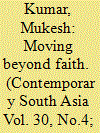

|
|
|
|
|
| Summary/Abstract |
This article historically and anthropologically examines the issue of religious conversion and identity formation among a Jogi community of religious converts. They were previously Muslims and changed their religious association to Hinduism after 1947. Individual and collective narratives of their religious conversion and the problems associated with forming a respected socio-religious identity indicate that religious conversion in South Asia is a non-linear event symbolising a complex process of becoming Hindu. The Muslim Jogis were not accepted by the Hindu Jogis after these conversions, leading to the formation of a new Jogi caste community called the Suddhi (purified) Jogis, popularly recognised in Alwar as a caste of converts. The community members still struggle to assert their Hindu identity. This article argues that converting to Hinduism may result in ‘social stasis’, signifying a ‘perpetual state of becoming’ due to the lack of complete social acceptance of converts by the traditionally recognised caste communities of ‘Hindus’.
|
|
|
|
|
|
|
|
|
|
|
|
|
|
|
|
| 5 |
ID:
178034
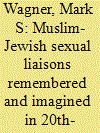

|
|
|
|
|
| Summary/Abstract |
Despite mutual taboos against exogamy, memoirs and similar materials written by Jews from Yemen contain a number of anecdotes describing love affairs and sexual encounters between Muslims and Jews prior to the mass migration of the vast majority of Yemen's Jews to Israel in 1949–50. These stories associate these liaisons with vulnerability, poverty, and marginalization. In them, sex and conversion to Islam are intrinsically connected, yet this interreligious intimacy leads not to resolution but to ongoing identity crises that persist beyond the community's realignment with a majority-Jewish society. The staging of the anecdotes in rural areas where shariʿa norms held only nominal sway, in watering places and hostels where strangers might interact, and at dusk, when identity is difficult to discern, heightened their ambiguity.
|
|
|
|
|
|
|
|
|
|
|
|
|
|
|
|
|
|
|
|
|